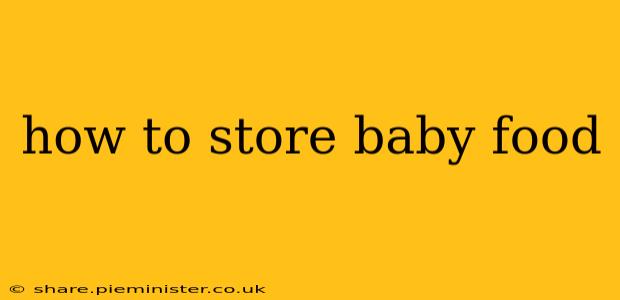Feeding your baby is one of the most important aspects of their development. Ensuring the food is safe and stored correctly is crucial for their health and well-being. This guide covers everything you need to know about storing baby food, whether you're making your own or using commercially prepared options. We'll address common questions and concerns to provide you with peace of mind.
How Long Can You Store Homemade Baby Food?
Homemade baby food offers unparalleled control over ingredients, but proper storage is critical. The shelf life depends heavily on the storage method:
-
Refrigerator: Most homemade baby food, stored in airtight containers, will last for 3-5 days in the refrigerator. Remember to label containers with the date of preparation.
-
Freezer: Freezing significantly extends shelf life. Homemade baby food can typically be stored in the freezer for 3-6 months. Again, proper labeling with the date is essential. Use freezer-safe containers to avoid spills and freezer burn.
How Long Can You Keep Opened Jars of Commercial Baby Food?
Commercially prepared baby food is convenient, but it's vital to follow the manufacturer's instructions. Once opened:
-
Refrigerator: Store opened jars of baby food in the refrigerator and use within 24 hours. Never refreeze baby food that has been thawed.
-
Room Temperature: Never leave opened baby food at room temperature for extended periods, as this can lead to bacterial growth.
What is the Best Way to Store Baby Food in the Freezer?
Freezing baby food is an excellent way to preserve it and have meals ready when needed. Here are some tips:
-
Portioning: Portion baby food into appropriately sized ice cube trays or small freezer bags. This avoids waste and ensures you only thaw what you need.
-
Freezing Methods: Use freezer-safe containers, ensuring a tight seal to prevent freezer burn. Label clearly with the date and contents.
-
Thawing: Thaw frozen baby food in the refrigerator overnight. Never thaw at room temperature or in the microwave. Once thawed, use within 24 hours. Never refreeze.
Can You Reheat Baby Food?
Yes, but gently. Never microwave baby food directly in its container, as this can create hot spots and uneven heating. Instead, transfer the food to a microwave-safe dish and heat gently, stirring frequently. Always check the temperature before feeding your baby to avoid burns.
How Do I Know if Baby Food Has Gone Bad?
Signs of spoiled baby food include:
-
Unusual Odor: A sour or foul smell is a clear indication that the food has gone bad.
-
Mold: Visible mold is a serious sign of spoilage and should be discarded immediately.
-
Change in Texture or Color: Significant changes in texture or color compared to the original state are cause for concern.
-
Off Flavors: If the food tastes off, don't hesitate to discard it.
Is it Safe to Reuse Baby Food Jars?
After thoroughly cleaning and sterilizing baby food jars, you can reuse them for storing other foods, following the same guidelines for storage as mentioned above.
What are the Best Containers for Storing Baby Food?
Freezer-safe, airtight containers are best for both homemade and commercial baby food. Glass containers are a good option, but plastic is also widely used. Choose BPA-free plastic if using this material.
How to Tell if Baby Food is Spoiled After Freezing?
Even frozen baby food can spoil over time. Discard any food showing signs of discoloration, unusual odor, or changes in texture. Pay close attention to the date you froze it.
By following these guidelines, you can ensure your baby's food is stored safely, maintaining its nutritional value and keeping your little one healthy and happy. Remember, when in doubt, throw it out!
